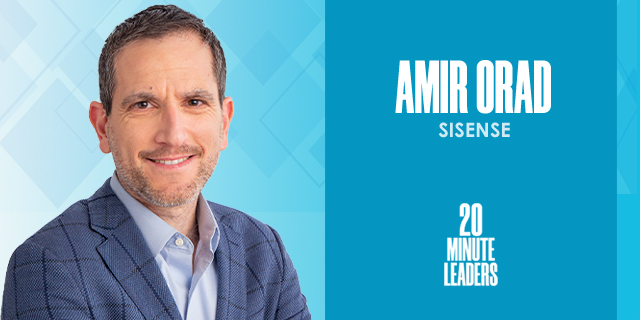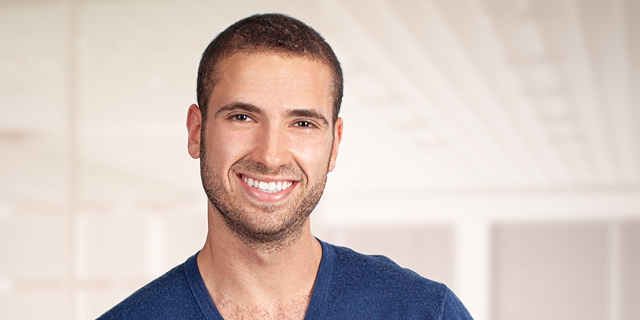
20-Minute Leaders
“In business, dreams can be achieved with the right north star and team around you”
Though he is a builder at heart, Amir Orad, CEO of Sisense, says that he’s learned the best way to build things is with a great team and a business around you
Click Here For More 20MinuteLeaders
Who, in essence, is Amir Orad?
It's quite simple. I'm a geek that has played with computers since I was a child. That led me to be identified by 8200 in Israel, and I spent six years building really cutting-edge technology around data, cyber, analytics, and security.
This was 1994, 1995. No one had a clue what we were talking about. This was ahead of its time. We created the foundation for what today is common in every organization out there. It was an opportunity of a lifetime.
When I left, there's only one thing you did as a technologist in that time, and that is start a company. I became a co-founder of Cyota, which was initially in the payments and anti-fraud space, and then became a cyber security company. Every day, you use what we invented. It's called "risk-based authentication.” When you log in and you get a text message saying, "This is a strange activity. Put your code in here."
I spent seven years leading product, delivery, and marketing. Then I moved to my second startup. I joined it early on. I was not a founder.
Are you a geek? Are you an entrepreneur? Was it really a trivial decision to start a company?
I am, deep inside, someone that likes to build stuff. I learned over the years that the best way to build something is with a kick-ass team and a business around you. It was very natural to evolve from a technologist to someone who can scale his thoughts and ideas with an amazing team and turn it into a business that has scale.
That's why in company number two, NICE Actimize, I didn't feel the need to be the founder. I joined an amazing team and built it to the next level. I spent eight, nine years doing that. After a short break, I started number three, which is, by the way, the number of my kids. I joined Sisense early on.
The reason I joined Sisense was that I realized we can build a platform that lets anyone build analytics into their products in an easy way and embed them into their business. We're empowering tech companies and big corporations. The beauty is that we are giving those companies similar technology that, once upon a time, I had to build myself. It's kind of the cyber and security markets and the analytics markets collided into building a platform that can help others do the same.
That mindset of ego aside and taking your geekiness and motivation and empowering a team to build that with you, where did you learn that?
It started already in the IDF, the realization that having a great idea and writing code by yourself is not the best way to achieve success. If you look at it as turning a diagram into an established, successful, highly used piece of technology, then it doesn't matter who writes the code; what matters is that you translate an idea into a working technology. Then the way to turn it into something that is vastly used is to build the business around it.
At the end of the day, to write beautiful code that is not used by anyone, it doesn't matter. It's not enough. I learned over time that I actually don't care whose idea it is. As long as I'm in love with it, it's as much mine as someone else’s. That was also a maturity curve I went through.
A long time ago, you’d already realized that data is eating the world and that making data-driven decisions goes hand in hand with the cybersecurity space. How do you see these two industries converging?
It's very, very clear. The era of writing hard-coded antivirus signatures and firewall rules is gone. It doesn't work against the bad guys who are just faster and better than a hard-coded solution. You have to move into a dynamic profiling and automatic creation, and you need to build systems to handle it. That leads naturally to machine learning and AI for detection and triage and for defense and protection. It's the only way to do it at scale and efficiently. I truly believe that. I've seen it on my journey, and I see it with Sisense every day.
Where is the next leap in your eyes? What is left to help optimize?
Everything can be optimized. You see it every day. You have some cutting-edge companies that are ahead of the market. That optimization will result in interesting things. It could be high quality care, education, entertainment, and then more free time. You'll have to fill that free time with something because people don't want to be bored. Jobs will change. That evolution has been going on for tens of thousands of years, but it's accelerating. It's impacting, now, every day of our lives.
I'm on the board of a company called Ava using AI and IOT to help women get pregnant without the use of intrusive techniques or other treatments. Over 30,000 babies were born thanks to that AI that personalizes medical care. I think our entire life is being evolved in front of our eyes.
What is it like to lead a thousand people? What concerns you as a leader?
The hardware is really important, but the "wetware" as we call it, the humans around it, are more important. As you scale a company, the challenges around culture, global teams, culture drift, and the need to focus more teams and align them are all real challenges.
They're actually more complex than technology because you're dealing with humans versus robots. You get the advantage: innovation, thinking outside the box, and other things. But you get the disadvantages: humans are very different, and helping a large team unite is hard work.
I can't imagine that you can even keep track of a third of what's happening in the company and your role is now to guide and empower everybody to be their own micro-leaders. Right?
First, you cannot do it. You need to rely on a very strong leadership team. Second, my personal style is to understand the details in a sampled way, a representative way, in order to build the mental image in my head of what's going on. Other people don't do that. They do it at a high level. But you never truly know what's going on. It's only a mental model you build.
I believe in a very accessible leadership style that allows people, customers, and prospects to talk to me more. I find it helpful for me. But you know what I’ve learned? There is no one way to lead. There's no one correct CEO style. Companies are built around the specific profile of the leaders in them. Many different styles can work as successfully at the end. That took me some time to understand. I thought there's some ideal, perfect way to do it. There isn't.
Where do you get your personal inspiration?
Number one, family. End of the day, my wife is probably my best role model. I still play computer games, different strategy games. I love going out and just enjoying life. Rock concerts are back. I literally bought tickets for 12 different shows in the next few months. You need to live hard and work hard. Not just one of the two.
Michael Matias, Forbes 30 Under 30, is the author of Age is Only an Int: Lessons I Learned as a Young Entrepreneur. He studies Artificial Intelligence at Stanford University, is a Venture Partner at J-Ventures and was an engineer at Hippo Insurance. Matias previously served as an officer in the 8200 unit. 20MinuteLeaders is a tech entrepreneurship interview series featuring one-on-one interviews with fascinating founders, innovators and thought leaders sharing their journeys and experiences.
Contributing editors: Michael Matias, Megan Ryan
